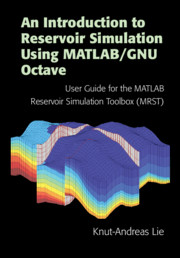 An Introduction to Reservoir Simulation Using MATLAB/GNU Octave
An Introduction to Reservoir Simulation Using MATLAB/GNU Octave from Part II - Single-Phase Flow
Published online by Cambridge University Press: 22 July 2019
The two-point flux-approximation (TPFA) scheme is robust in the sense that it generally gives a linear system that has a solution regardless of the variations in K and the geometrical and topological complexity of the grid. The resulting solutions will also be monotone, but the scheme is only consistent for certain combinations of grids and permeability tensors K. This implies that a TPFA solution will not necessarily approach the true solution when we increase the grid resolution. It also means that the scheme may produce different solutions depending upon how the grid is oriented relative to the main flow directions. In this chapter, we first explain the lack of consistency for TPFA, before we introduce a few consistent schemes implemented in MRST, including the mimetic finite-difference method and one example of a multipoint flux approximation method (MPFA-O). These can all be written on a general mixed hybrid form, which is motivated by mixed finite-element methods. We explain how you can specify different methods that reduce to known methods on simple grids by adjusting the inner product in the mixed hybrid formulation.
To save this book to your Kindle, first ensure [email protected] is added to your Approved Personal Document E-mail List under your Personal Document Settings on the Manage Your Content and Devices page of your Amazon account. Then enter the ‘name’ part of your Kindle email address below. Find out more about saving to your Kindle.
Note you can select to save to either the @free.kindle.com or @kindle.com variations. ‘@free.kindle.com’ emails are free but can only be saved to your device when it is connected to wi-fi. ‘@kindle.com’ emails can be delivered even when you are not connected to wi-fi, but note that service fees apply.
Find out more about the Kindle Personal Document Service.
To save content items to your account, please confirm that you agree to abide by our usage policies. If this is the first time you use this feature, you will be asked to authorise Cambridge Core to connect with your account. Find out more about saving content to Dropbox.
To save content items to your account, please confirm that you agree to abide by our usage policies. If this is the first time you use this feature, you will be asked to authorise Cambridge Core to connect with your account. Find out more about saving content to Google Drive.